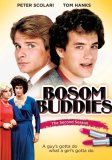| Reviews & Columns |
|
Reviews DVD TV on DVD Blu-ray 4K UHD International DVDs In Theaters Reviews by Studio Video Games Features Collector Series DVDs Easter Egg Database Interviews DVD Talk Radio Feature Articles Columns Anime Talk DVD Savant Horror DVDs The M.O.D. Squad Art House HD Talk Silent DVD
|
DVD Talk Forum |
|
|
| Resources |
|
DVD Price Search Customer Service #'s RCE Info Links |
|
Columns
|
|
|
Bosom Buddies - The Second Season
"Who is it?"
Tucked away on Friday nights, when the very audience that would have responded to it most favorably were already out partying, Bosom Buddies, the hippest, funniest sitcom of 1980-1982, lingered and died a slow ratings death (even though it regularly won its time slot). Fans of the Some Like it Hot-inspired spoof knew Bosom Buddies was something different, something special amid the more established sitcoms like The Jeffersons, Alice, and Too Close for Comfort, but back in 1982, sitcoms that underperformed in the ratings (according to studio expectations) were a dime a dozen, and eminently disposable. Bosom Buddies was axed in the spring of 1982, and essentially forgotten by all but it small, loyal fan base.
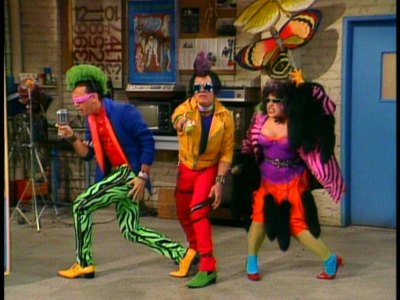
And then one of its stars, Tom Hanks, broke out of minor TV guest spots on Taxi and Happy Days in 1984 with Splash, a huge theatrical hit, and Bosom Buddies was back. NBC reran the show that summer (much to the delight of fans), and later, when Hanks' star rose even higher, with blockbuster movie grosses and multiple Oscars, Bosom Buddies went into regular syndication on TBS, gaining more and more fans who finally got to see what a bright, funny, hip show it had been.
It seems so commonplace now, so thoroughly ingrained in most of our sitcoms today, but few people give credit to Bosom Buddies for being one of, if not the, first prime-time network TV sitcom to incorporate the whole ironic, self-reflexive, pop-culture referencing humor then found only on Saturday Night Live or at comedy groups like Second City or The Groundlings, or in movies like Animal House and Caddyshack. I was fifteen when Bosom Buddies aired, and I remember laughing in amazement when the show made unexpected references to the on-set difficulties during filming of Apocalypse Now, the death of disco, the punk rock/New Wave scene, and California surfer/dopers. You had to be hip to the current entertainment and social scenes to get some of the inside jokes on Bosom Buddies, making the regular fan feel like an insider who was let in on something special (something you definitely didn't have to be for the older-skewing sitcoms ruling the Nielsen roost at time, such as Archie Bunker's Place and One Day at a Time). The constant dead-pan ripostes and ironic one-liners based on current pop culture obsessions, found in mega-hit series like Friends and Seinfeld, can trace some of their development directly back to Bosom Buddies.
Of course at the time, most newspaper TV critics (there's an odious little job title if I ever saw one) at the time viewed Bosom Buddies as just another crass, dirty joke of a show, aping the brilliant Some Like it Hot. They saw Hanks and the equally talented Peter Scolari dressed in drag, prancing around that angel from Heaven, Donna Dixon, usually decked out in work-out clothes or something slinky slit deep up the side, and they pegged the show as lame or smutty (or both). But that didn't surprise fans of the show, who suffered in silence when the series was canceled, convinced individually, that they were the only ones to enjoy the show (things were a lot different then: TV ratings weren't regularly reported like they are now, and the unifying force of the internet, where fans of anything can gather to talk, was just a sci-fi fantasy at this point). Most of those TV critics thought the height of television sitcom fare at the time was M*A*S*H, the brilliant, but by 1982 severely compromised and faded, sitcom legend. They didn't "get" Bosom Buddies.
But seen today, Bosom Buddies seems just as fresh and funny as it did over twenty-five years ago (25 years ago? That's not possible!). And it can't just be the popularity of Hanks over the years that has kept Bosom Buddies running in syndication. There are currently a lot of big-named stars out there who have had failed sitcom beginnings, and you don't see those shows running for years and years in syndication - particularly with only 37 episodes comprising the entire series run. The little cult hit that "couldn't" back in 1982, has had surprising legs, gaining new fans every time its rerun.
Which brings us to discussing Season Two of the series. With the cast comfortably in-tune with each other's strengths and line deliveries (even Dixon, whose first couple of episodes during the first season were rough, has become adept at playing up her blonde bombshell looks), Bosom Buddies: The Second Season confidently cranks out expertly timed slapstick (particularly whenever Hanks and Scolari get a chance to throw themselves around the ultra-cheap sets), and snotty, ironic one-liners ("I love bundt cake!" "All fascists do."). Hanks and Scolari, one of the best, least seen comedy teams in television history, are like a well-oiled machine, playing off each other with an invisible, subliminal synchronization to their playful antics that's a marvel to see.
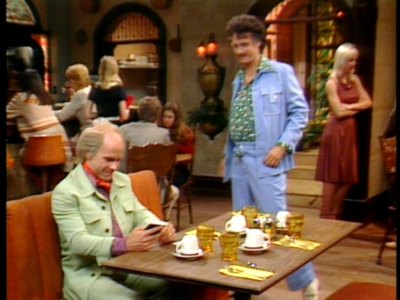
Watching them, you'd think they had been a comedy team for years and years. It's been popular to discuss the career trajectory of Hanks versus Scolari, but for my money, before two Oscar wins and the mantle of "heavyweight, influential Hollywood industry leader" weighed him down into pomposity and dullness on screen (just watch The Da Vinci Code for proof), Hanks was never looser, never wilder and hipper, than he was here and in his first few movies (with Joe Dante's sublime The 'Burbs probably the last time we saw Hanks at his proto-craziest). As for Scolari, a masterful mime and physical comedian, Bosom Buddies was hardly a dropping off point; he has stayed an in-demand, working actor (most notably his long stint on Newhart) - quite an accomplishment for a lead actor in a failed initial sitcom. I'm not sure why Hanks and Scolari never co-starred in a big-screen feature, but it's a shame they never did - Hanks, for my money, was never funnier, never more appealing, than when he played off the alternately quiet and bombastic Scolari (since Hanks' big-screen career has taken a turn south, how about a big-screen version of Bosom Buddies, guys?).
The rest of the cast does their best to stay up with Scolari and Hanks, but clearly, the show is geared to their shenanigans, and the rest pick up the scraps. Dixon has no trouble keeping our attention, as is obvious by her pictures (she's also actually quite funny this season, getting into the manic, ironic spirit of the show). And the delicious Holland Taylor effortlessly steals the scenes she's in (they're increased in this season, when she goes into business with the boys in their own production company), with her wry, decidedly wicked line deliveries, and the increasingly perverse tone the writers have imparted to the character (apparently, there's no sexual diversion that Ruth Dunbar hasn't partaken in - and enjoyed thoroughly). Only Wendie Jo Sperber's presence seems reduced this season; the writers, evidently feeling that her pursuit of Scolari's Henry had basically run its course, tone down their scenes together, until she's basically just a second banana to Hanks and Scolari. The sublime comedienne, Lucille Benson, who played Lily Sinclair, the Susan B. Anthony Hotel for Women's manager the previous year, is gone this season; sassy neighbor Thelma Hopkins moved up to the position, but it didn't exactly help her get more quality screen time. She's funny, but again, she had to be content with picking up leftover lines and gags.
The central gimmick of the boys dressing up as women to stay in the all-girls hotel is largely abandoned this season, with Kip and Henry "coming out" to Dixon's Sonny and the rest of the cast. It was a smart move, allowing the writers to now use the drag sequences as pure comedy scenes, and not integral plot devices that strained audience credibility. And as well, with the boys now welcome guests at the hotel, their dragging around ups the surreal quality of the show. Most of the episodes in this second season of Bosom Buddies try and break out of the relatively rigid formula of the first season (how do the boys keep tricking everybody that they're women), by branching out with stories set at their new production company, and with more standard sitcom devices such as the "flashback" episode. The production company angle does allow for more clowning, and the two flashback episodes this season (the absolutely hilarious The Reunion, and The Way Kip and Henry Were) give Scolari and Hanks the chance to dress up and spoof high school and college students - the very audience that was probably tuning into the show.
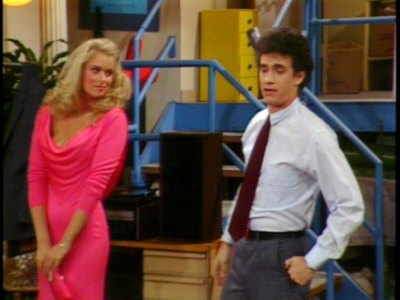
The only confusing element to Bosom Buddies: The Second Season is the progression of the central storyline in the series: Hanks pursuit of Dixon as a serious girlfriend and lover. In the opening episode, The Truth and Other Lies, Kip reveals his ruse of dressing like a woman to Sonny, which causes a crisis in their burgeoning relationship. At the episode's end, Kip has broken through to Sonny, confessing his real love for her, and the show fades out with Kip and Sonny apparently ready to make love (the show then humourously shows cliched film clips of events synonymous with cinematic lovemaking, including a rocket lifting off the pad, and two trains smashing together). So...why are the rest of the season episodes all about Kip trying to define his relationship with Sonny, including his rather desperate (and entirely understandable) efforts to sleep with Sonny? Even Henry refers to the fact that they haven't slept together in Kip Off the Old Block, ten episodes after The Truth and Other Lies. Was The Truth and Other Lies shot out of sequence? Or was it a left-over episode shot late in 1981, in an effort to stockpile shows with the looming writer's strike that plagued the networks in the 1981-1982 season? Or did the creators actually get the two together...and then re-think the concept and separated them? It's a curious development in the series, perhaps made more noticeable when you watch all the episodes in a block.
Here are the 18, one-half hour episodes of Bosom Buddies: The Second Season, as described on their insert, along with some of my favorite lines from the episodes. PLEASE NOTE: As with most vintage TV series released by CBS/Paramount, there is a small disclaimer at the back of the DVD slimcase that states, "Some music has been changed for this home entertainment version. Some episodes may be edited from their original network versions." There is no further explanation of what cuts, if any, were made. Of course, most fans of Bosom Buddies already know that Billy Joel's iconic My Life, the original theme of the series that plays over the boys cavorting around New York, hasn't been retained for the DVD versions of the show. The show's end theme, Shake Me Loose, used as instrumental, has been elevated to an opening vocal by Stephanie Mills for these syndicated versions. And guess what? It doesn't work for a second. Joel's song, so integral to the whole point of the series, immediately jacked you up for the series' experience, and with it missing here, it's like a noticeable hole in each episode. You can play Joel's music over the titles, I suppose, but that's annoying and ultimately too much trouble, so...it's up to you if you can live with the omission. I didn't notice anything else egregious in the editing (although there were one or two strange fadeouts-to-black that seemed suspicious). The realities of DVD releases of TV shows is strictly an economic one - something more rabid fans of their favorite shows seem to not understand. I don't like the studios not spending the money to make each TV DVD release as perfect as possible, but extenuating circumstances can make it impossible for studios to make a profit on releases if they went whole hog for each vintage release. Again, it's up to you whether or not you support such practices by the studios. Edited TV shows are one of the hottest topics concerning DVD releases, and as a reviewer, I've taken both sides of the issue, depending on what title I'm reviewing. It's usually a case-by-case basis. Here, with Bosom Buddies: The Second Season, the show is so enjoyable, and the fact that most of the run times seem complete, prompts my favorable rating:
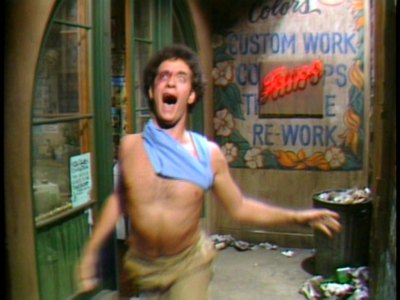
DISC ONE
The Truth And Other Lies
As his relationship with Sonny heats up, Kip feels he needs to tell her he's been in disguise as a woman, and chooses a fancy embassy party to come clean.
"We have the same future as disco!"
There's No Business...
Henry uses his and Kip's savings to buy his uncles's commercial production house, unaware that the business is in the red.
"In my high school yearbook, I was voted most likely to be on the methadone program."
The Reunion
At their high school reunion, Henry feels guilty when he sees a deaf girl he once stood up. And Sonny is irritated that Kip uses her to impress his old classmates.
"You are horking me royal!"
The Road to Monte Carlo
After an elevator accident at the hotel, the buddies get a big insurance check and decide to go gambling -- in Monte Carlo!
"I think I'm the middle-weight champion of the Holy Roman Empire!"
WaterBalloonGate
After the guys accidentally drop a water balloon on Richard Nixon's car, they are put under surveillance by the Secret Service.
"Ladies, you're about to receive the most thorough and intimate frisk of your lives."
All You Need is Love
Realizing he's never found true love, Henry decides to try video dating. Meanwhile, Kip is hoping his relationship with Sonny will turn physical.
"Isn't this guy sensitive? He makes Alan Alda look like Vlad the Impaler."
DISC TWO
Other Than That, She's a Wonderful Person
Henry becomes lovestruck when he meets the new interior decorator that Ruth hired. Trouble is, his best friend Kip can't stand her.
"Southern California, huh? Yes, the ivy-covered halls of Uck-Law, where the highest artistic achievement is being Anson Williams' manager."
The Slightly Illustrated Man
After Sonny catches Kip out on a date with another woman, he gets drunk and decides to get a tattoo to prove his devotion to her.
"I taste floor."
Two Percent Solution
When Ruth quits her agency job, she comes to work at the production house and immediately competes with Kip and Henry over Amy's controlling share.
"For heaven's sake; you look like a couple of homecoming queens from Drag U."
The Grandfather
Henry saves the life of a little girl whose grandfather rewards the guys with lots of new accounts. But then Ruth informs them that he is an underworld kingpin.
"Kip, I love you!" "What do you mean?" "I don't know." "Henry, we're going to have to talk about this!"
Kip Off the Old Block
When Kip's parents visit New York, they get into a huge fight at a dinner party and Kip has to try to get them back together again.
"Well...you know...thanks for all the stuff you did." "That's real warm, Dad."
Hildy's Dirt Nap
An immigrant develops a huge crush on Hildy and wants to propose. So Kip convinces Henry the only way to discourage him is to stage Hildy's funeral.
"Thank you, Amy, for that warm and tender concept that helped everyone forget their sadness and grief long enough...to be shocked and disgusted!"
DISC THREE
The Way Kip and Henry Were
The guys recall the first time they met Ruth, when they thought they would be hired as a team straight out of college. But Ruth had other plans.
"I'm Ricky." "I'm Dave. Dad's at work -- wherever that is."
Who's on Thirst?
While Kip and Henry are stuck in a winter cabin with no food or water, the girls are stuck back at the studio, doing a commercial with a large tiger.
"What did you carve?" "A Maserati." "Big deal -- no tape deck."
Not With My Sister, You Pig
Kip's worried about his visiting sister, so he places her in Henry's care. But after Henry gets in late, they fight and wind up in the hospital.
"Howdy, punkers. I'll bet you're saying, 'Hey, he looks sharp.' And I'll bet you're asking, 'Hey, where can I get high-quality New Wave supplies at discount prices?'"
One For You, One For Me
After he berates Kip for abusing the company funds, Henry takes charge of the finances. But while trying to save money, he buys a stolen VCR and is arrested.
"Hey, Donner Party? Bon appetite!"
Not the Last Picture Show
Ruth makes fun of the gang for acting so old. So they all fantasize about what it would be like to be senior citizens.
"We saw this hot New Wave band called the Grisly Cheese. In their finale they spit on their audience and left the kids screaming for more...so I spit on them."
Cablevision
In order to land an important client, Kip and Henry broadcast their own variety show on cable television, with help from Amy, Ruth, and all their friends.
"What happened to the old theatrical values of rhythm, pace, energy and flow?" "Hi, I'm Flo; kiss my grits!"
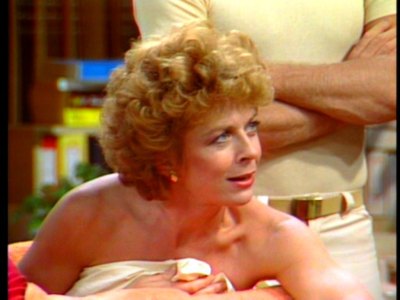
The DVD:
The Video:
Bosom Buddies: The Second Season was shot on video, and it looked like crap when it was first broadcast. Still, it looks about as good as it's going to get here on this full-screen transfer.
The Audio:
The Dolby Digital English Mono audio mix accurately recreates the original broadcast presentation. Close-captioning is available.
The Extras:
As kind of a cool extra, there's a vintage, studio-produced sales pitch to sell Bosom Buddies to stations for syndication. It emphasizes Hanks success in Splash and Bachelor Party, so it had to be made around 1984 or 1985. It runs almost seven minutes, with funny clips from both seasons.
Final Thoughts:
Just as smart, funny, hip and clever as it was 25 years ago, Bosom Buddies: The Second Season is a must-have for those who love vintage TV. It definitely belongs in the top tier of 1980s sitcoms, and Tom Hanks and Peter Scolari are one of the most winning, appealing screen comedy teams in the medium's history. Too bad they couldn't afford Billy Joel's theme song for this DVD release, but the show is strong enough to survive the loss (just crank up your own copy of My Life over the opening credits). I really miss the Tom Hanks from this period, and we need to see more of Scolari on the tube. I highly recommend Bosom Buddies: The Second Season.
Paul Mavis is an internationally published film and television historian, a member of the Online Film Critics Society, and the author of The Espionage Filmography.


|
| Popular Reviews |
| Sponsored Links |
|
|
| Sponsored Links |
|
|
| Release List | Reviews | Shop | Newsletter | Forum | DVD Giveaways | Blu-Ray | Advertise |
|
Copyright 2024 DVDTalk.com All Rights Reserved. Legal Info, Privacy Policy, Terms of Use,
Manage Preferences,
Your Privacy Choices | |||||||









